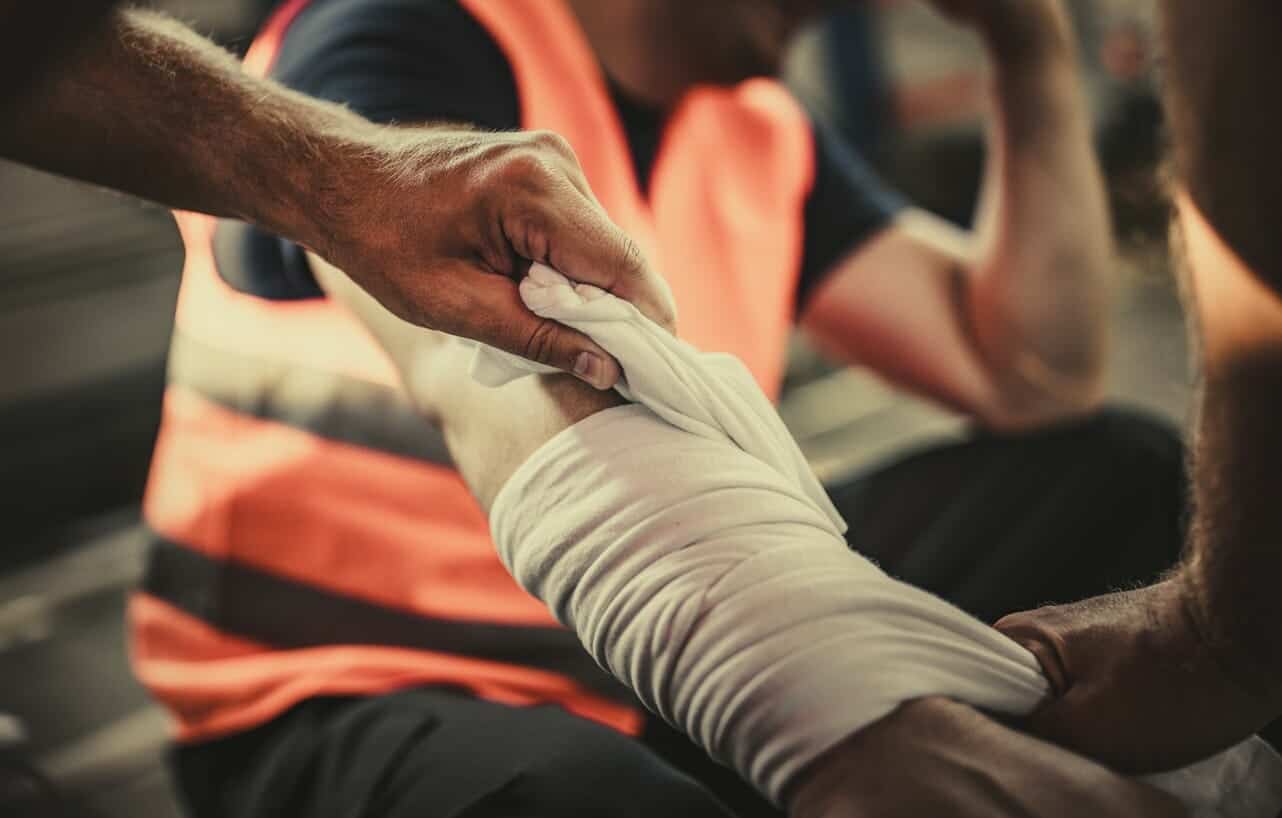Navigating a workers’ compensation claim is complex and frustrating, and adhering to deadlines and meeting the legal requirements is critical to the success of your claim. Below we discuss 12 steps to take after a workplace accident to assist employees injured at work. While these Virginia workers’ compensation tips are helpful to put you on the path to receiving workers’ comp benefits, please recognize that the process is nuanced and it may be in your best interest to hire a skilled Virginia workers’ compensation attorney to guide you through the process and allow you to focus on your recovery.
12 Things To Do After A Work Accident
Your top priority immediately after an accident should be attending to your medical needs. Not only is diagnosis and treatment of your injuries necessary for your own health and well-being, but obtaining a timely and proper medical diagnosis is also essential to a successful Virginia workers’ compensation claim. After an accident, follow the below tips related to your injuries.
1. Receive proper emergency medical care or first aid
Authorization from an insurance company or employer is not necessary if your injuries require emergent medical care. Seek care from the nearest medical facility appropriate to tend to the needs of your injury.
2. If emergency care is not necessary, ask your employer for a panel of physicians
If your injuries do not require emergency care, request a panel of physicians from your employer. The Virginia Workers’ Compensation Act (Section 65.2-603) requires your employer or the employer’s insurance company to provide you with a panel of at least three physicians to choose from. In this instance, you are limited to the list of physicians provided.
3. Tell your healthcare provider you were injured in a work accident
In an effort to lower workers’ compensation premiums, some employers may give misdirected advice to employees advising them to mislead a healthcare provider into believing the injury was not the result of an accident at work. Not only is this fraudulent, but the employee will likely be ineligible for workers’ comp benefits. Always be truthful with treating providers about the cause and nature of your injuries.
4. Take photographs of your injuries
Photographs are one of the best ways to document your injuries and offer compelling evidence of the extent of the damages you sustained as a result of a work accident. Photograph any injured body part, including swelling or bruising, and continue to take photographs overtime as you begin to heal.
5. Maintain a log detailing the status of your injuries
Depending on your injuries this may include documenting pain ratings and frequency of medication taken to address pain; activities you can no longer participate in; sleep disturbances; issues with memory, vision, or concentration; or any other symptom you experience.
6. Follow through on all recommendations from healthcare providers
This includes attending all appointments, following through on any referrals to specialists, and following the care plan set forth by your providers. It can be difficult to fully assess the extent of your injuries attributable to the accident if you fail to follow recommendations from treating providers.
If you are injured on the job, do not delay in seeking medical attention. Not only should you receive medical attention to diagnose and treat your injuries, but delaying treatment raises doubts about whether you were injured at work or somewhere else while off the clock. This doubt may work against you.
7. Immediately after the accident, or as soon as practically possible, write down every detail you can recall
It is essential that you notify your employer of the work accident as soon as practically possible because a delay in reporting could result in lost benefits and even disciplinary action in some instances. All reporting should be done as completely and accurately as possible, so take the time to regroup and reflect on the circumstances surrounding your accident if necessary (while keeping in mind all relevant deadlines).
Relevant details may include:
- date, time and location of the accident;
- names, job titles and contact information for any witnesses;
- description of what you were doing immediately before the accident, including the equipment you were working with and the conditions you were working in;
- description of your actions at the time you were injured, including the equipment or material you were working with and the conditions you were working in; and
- Name and job titles for any supervisors working at the time of the accident.
No detail is insignificant and always consider the environment and equipment or materials involved. For instance, how was the lighting? Was the floor wet? Was there anything out of the ordinary (e.g., any deviation from normal routine or procedures)? What equipment were you using at the time of the accident?
8. Report the accident to your employer within 30 days
Virginia’s Workers’ Compensation Act (Section 65.2-600) lays out specific requirements related to an employee’s duty to report a work accident. Failure to follow these requirements and meet the notice deadlines may result in harsh consequences in terms of an employee’s ability to collect workers’ comp benefits. Generally, an employee is required to notify the employer of the accident in writing within 30 days of the accident (unless the employer is a statutory employer, in which case notice must be given at least 60 days prior to the workers’ compensation trial). This written notice must contain the employee’s name, address, time and place of the accident, a description of the accident, the injuries sustained, and all locations the employee experiences pain, swelling, and other symptoms. The notice must be given to specific people depending on the nature of the employer, but you should provide notice to your supervisor and foreman, human resources department, business owner, and treating physician. Sharing your notice with a co-worker will not satisfy these requirements.
The requirements may vary in limited instances, for example, if an employer has actual notice of the accident then written notice is not required. To be sure you are meeting all the requirements, it may be best to contact an experienced Virginia Workers’ Compensation Attorney to assist you.
9. Take photographs of the accident scene
If you are able to take photographs of the accident scene do so as soon as possible, especially if the photo shows the cause of the accident.
10. File a report with the Virginia Workers’ Compensation Commission
An injured worker must file a claim with the Workers’ Compensation Commission within two years from the date of the accident. An attorney can be particularly helpful in filling out the claim and helping to ensure you obtain the benefits you are entitled to. While an employee has two years to file a claim, delaying filing is not advised.
11. Pay attention to deadlines
Ignoring deadlines associated with notifying your employer or filing your claim with the Workers’ Compensation Commission may prevent you from collecting any benefits associated with your workplace accident.
12. Employers cannot terminate employees for filing workers’ compensation claims
While you may be hesitant to file a claim out of fear of retaliation from your employer, know that it is illegal for an employer to fire you for filing a claim. If you have been injured in a work accident, your health and recovery should be the primary focus at this time.
Reach Out To An Experienced Workers’ Compensation Attorney in Richmond, VA
Trust Renfro & Renfro’s Virginia workers’ compensation attorneys to manage the deadlines and tackle the responsibilities associated with your workers’ compensation claim. Contact Renfro & Renfro today for a free consultation or with any questions.





